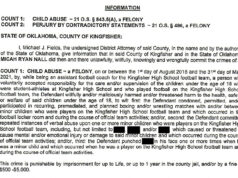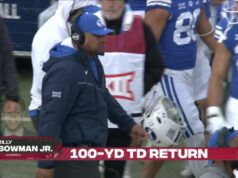
Kris Steele is the executive director of The Education and Employment Ministry (TEEM) in Oklahoma City. He earned a bachelor’s degree in religion from Oklahoma Baptist University in Shawnee and a master’s degree in education from East Central University in Ada. From 2000 through 2012, he served in the Oklahoma House of Representatives, representing the people of District 26 in Shawnee. In the 2011 and 2012 legislative sessions, Steele served as Speaker of the House. The following Q&A transpired over email.
What is The Education and Employment Ministry, and how do you seek to accomplish your mission?
TEEM is an Oklahoma City-based nonprofit dedicated to breaking cycles of incarceration and poverty through education, personal development and work-readiness training. We seek to fulfill our mission by providing basic education, job training, legal assistance, mentoring and case-management services to individuals transitioning from incarceration to the community.
What is the best part of your job?
The best part of my job is working directly with the incredible men and women we serve. My faith causes me to believe everyone deserves a second chance, and there is no such thing as a spare Oklahoman. I feel honored to help people prepare to overcome a troubled past and replace despair with hope and a bright future. I also am privileged to work with an amazing staff, which is also a blessing.
“Unfortunately, a felony conviction often becomes a scarlet letter alienating a person for life. Public safety increases, quality of life improves and communities are strongest when everyone is allowed to contribute to the greater good.” Kris Steele, TEEM executive director
Tell us a success story.
Fortunately, there are many success stories to choose from. We work with a man named Victor who currently participates in a work-release program. At age 11, Victor was homeless and addicted to methamphetamine. He used drugs to ease the physical and emotional pain of living on the streets. He began selling drugs to survive and had multiple encounters with the court system, landing him in prison several times. Victor was tired of the merry-go-round cycle of being in and out of incarceration and was ready for a life change when TEEM started working with him about a year ago. After completing a series of cognitive behavior classes and work-readiness courses, Victor is now a department manager at a metro-area grocery store. He is doing great.
What is a barrier you face in doing this work?
The greatest barriers we face are negative stereotypes and misconceptions surrounding individuals impacted by incarceration. Most men and women re-entering society are no different than anyone else. These are talented individuals who want to be productive members of society. Yes, they have stumbled, but they have served their debt and should be given an opportunity to participate in prosocial activities. Unfortunately, a felony conviction often becomes a scarlet letter, alienating a person for life. Public safety increases, quality of life improves and communities are strongest when everyone is allowed to contribute to the greater good.
How is TEEM funded, and how are nonprofit organizations in Oklahoma weathering a slow energy economy that limits some donors’ liquidity?
TEEM is funded through a variety of sources, including private donations, corporations, foundations, collaborations and grants. The downturn in the energy sector certainly affects the economy in Oklahoma. As such, nonprofit organizations should maintain diverse funding portfolios and seek to work with other service providers to leverage support and maximize resources.
You served two years as the Speaker of the Oklahoma House of Representatives before the 12-year term limit ushered you out of office. Would you have liked to have held that position longer? What are your thoughts on legislative term limits?
I thoroughly enjoyed serving the public as a legislator and would have continued to serve if not for term limits. There are pros and cons to term limits, yet overall I am opposed to the practice. Elected officials are accountable to the people and can be voted out of office in any election. Most concerning is the degree of knowledge and expertise forfeited with term limits. It takes time for a freshman legislator to understand issues, build relationships and navigate the process. Within the legislature, knowledge is power. I fear too much power and influence have shifted to special interest groups because lobbyists and those hired to sway political decisions possess the most knowledge.
Many people may not know you helped lead a substantial overhaul of Title 10 in Oklahoma statutes, which deals with children. In your opinion, what are today’s main issues regarding foster care, adoption, kids in custody, child abuse and juvenile justice?
Oklahoma has made strides in dealing with children in need of state services thanks in large part to what is known as the Pinnacle Plan, a strategic agreement to reorganize departments, increase efficiencies, reduce caseloads, recruit more foster families and enhance funding for direct services within DHS. The issues surrounding child abuse, neglect and delinquency are difficult and complicated. A major investment in community-based resources such as substance abuse treatment, mental health services and job training is a good start. Unresolved trauma can wreak havoc within a family for generations. Equally important is a long-term commitment to improving and enhancing educational opportunities for all children. Education is key to breaking cycles of abuse and poverty. Also, the faith community has a tremendous opportunity to address many of these issues. If every local congregation of faith accepted responsibility to care for, nurture, teach and support one or two children in need, we could see outcomes improve significantly.
It’s no secret that you were frustrated when the Justice Reinvestment Initiative stalled out a couple of years ago. The initiative was projected to save the state hundreds of millions of dollars in the long run and decrease jail populations while increasing resources for drug courts and programs like you now operate at TEEM. You were heavily involved in the legislative passage of that as well, but when you left office the initiative fell apart. Have you ever figured out what went wrong with JRI? What do you wish could have happened?
I was very frustrated when the JRI languished after I left office, not only because of the savings it could bring to our state, but more importantly the needed services like prevention, intervention and treatment it would have provided for individuals in need. JRI calls for an investment in services that address root causes of criminogenic behavior. In short, it was a public safety plan for Oklahoma. My best guess is, at the time, personal agendas and politics prohibited the plan from moving forward. However, we have not given up the fight to implement a better way of dealing with low-risk, nonviolent offenders. In fact, there appears to be a renewed interest in the subject, and Gov. Fallin, Speaker Jeff Hickman (R-Fairview) and Senate President Pro Tempore Brian Bingman (R-Sapulpa) have publicly expressed support for meaningful corrections reform. I am thankful for their leadership and optimistic about the future.
You are a Shawnee man, through and through. How are things in Pottawatomie County, and what’s the biggest development of 2015?
Thank you for that designation. I love my community and am proud to live in Shawnee. A new strip mall with Hobby Lobby as an anchor store, new restaurants along I-40 and the addition of a football team at Oklahoma Baptist University (my alma mater) are among the biggest Shawnee developments in recent years.
Can you share any classic stories about former Gov. Brad Henry? You know, back before he was governor and before you were Speaker of the House. Let’s think 1990s. What kinds of haircuts did you guys have, and did Republicans and Democrats get their haircuts from separate barbers?
Gov. Henry is a very dear and close friend. Sufficed to say, we have both had our share of bad haircuts. Most of the citizens living in Shawnee care more about the person than the party, therefore we get our hair cut, shop, bank, buy groceries and get our oil changed at the same businesses. I served as a member of the House while Brad Henry was still a state senator for two years. We sort of had this unspoken rule that, when we talked to an angry constituent, it was OK to blame each other for whatever caused the constituent to be upset. (I probably used this defense mechanism a lot more than he did.) Shortly after Gov. Henry was sworn into his first term, I was speaking to a group of fourth graders at Will Rogers Elementary. The teacher introduced me as “someone who works at the Capitol,” and then asked, “Do you know who he is?” A boy on the back row said, “You are Gov. Henry, right?” I quickly responded, “No, of course not. I’m much better looking than Gov. Henry!” All joking aside, I have the utmost respect and admiration for Brad Henry and his family.
What advice would you give to young politicians just entering the arena today?
I would advise young politicians entering the arena today to rise above partisan bickering and political platitudes. I would encourage them to place people over parties and focus on issues truly important to our state. There is great value in civil discourse, so don’t be afraid of discussing relevant topics with those who may hold a different opinion. Always tell the truth. Always stand up for what you believe in. Be respectful. You may not always be aware of what circumstances formed another’s perspective. Be courageous, but also courteous. And stay true to yourself. Most newly elected officials head to the Capitol believing they are going to change the world. Yet, I believe the secret is to not let the political environment change you.





















